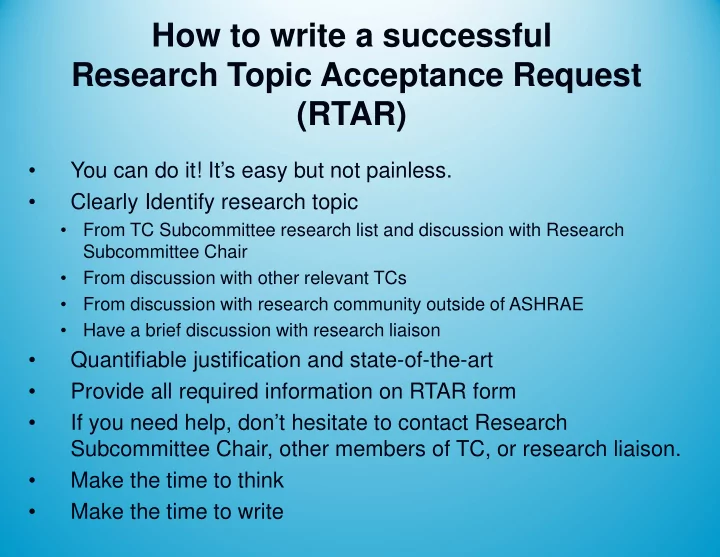

How to write a successful Research Topic Acceptance Request (RTAR) • You can do it! It’s easy but not painless. • Clearly Identify research topic • From TC Subcommittee research list and discussion with Research Subcommittee Chair • From discussion with other relevant TCs • From discussion with research community outside of ASHRAE • Have a brief discussion with research liaison • Quantifiable justification and state-of-the-art • Provide all required information on RTAR form • If you need help, don’t hesitate to contact Research Subcommittee Chair, other members of TC, or research liaison. • Make the time to think • Make the time to write
Relate to ASHRAE resear ch � Focus on the ASHRAE Strategic Plan for Research � RTARs that identify with the specific Strategic Plan goals get accepted � ���������������������������������������� � Once topic is selected, discuss briefly with Research Subcommittee Chair and research liaison.
Clearly Identify research topic and its value � Review key literature - RTARs that demonstrate a firm grasp of relevant prior work get accepted. � Clearly define the State-of-the-Art and highlight gaps - do not leave RAC wondering if it’s been done before � Define a valuable and achievable objective – will the make a significant contribution show RAC that the work is well conceived. � Coordinate with other relevant TCs – this minimizes the chance that there is overlap with other RTARs and allows for more thorough evaluation of topic. � Discuss topic and objective with research subcommittee chair and liaison � Actively solicit co-funding - RTARs that have been reviewed by another funding organization that express support get extra consideration. It pays to do your homework!
Make your case Clearly Identify the Research Strategic Plan goals served – RTARs � get accepted that identify specific ASHRAE goals and how research achieves them. Clearly define the Advancement to the State-of-the-Art - RTARs that � provide quantitative estimates of the improvement expected get accepted. Clearly define the Justification and Value to ASHRAE � � Identify by number, profession or industry the ASHRAE members impacted. � State the likelihood that the improvement developed through the research would be adopted. � Quantify the anticipated time period over which widespread adoption would take place. � Indicate likelihood of ASHRAE intellectual property. Provide realistic estimated costs and duration �
Work with your Research Liaison � Make sure your research liaison is informed! � Liaisons present arguments for your RTAR to the entire RAC. A liaison knowledgeable about your project is better able to persuade RAC to approve it. � Briefly discuss topic with liaison before starting RTAR � Have your liaison review the RTAR before the TC vote! � Liaisons can identify reasons the RTAR might be returned before you vote it and submit it to MORTS/RAC, saving you at least 6 months! � If your project is unusual, controversial, or urgent (or if you happen to have free time) attend the relevant RAC meeting to speak for RTAR and answer questions.
Use the RTAR form!! http://www.ashrae.org /technology/page/39
Adobe Acrobat Document
RTAR Outline Title: Executive Summary Research Need Applicability to ASHRAE Research Strategic Plan State-of-the-Art (Background): Advancement to the State-of-the-Art: Project Objectives Expected Approach Relevance and Benefits to ASHRAE Applicability to ASHRAE Research Strategic Plan: Advancement to the State-of-the-Art: Application of Results: Anticipated Funding Level and Duration References
����������� ��������������������� ����������� ������������������������������������������������������������������ � ������������������� � ������������������������������� � ��� !���������!���������������� �����!������ � "��������� ��������������������������� �������������!�������������������� � ������ #�������������� ������� � ��$�������������������$��������������$�����%�����������!���& � '�����������������!������� �������� �������������������������������$�����(��������%� � ���$�����) "������������������� ���$��������������$������������!������!�������������� � *���������������������������!��������������������!�������������&�����%�!�+!���� %� � ������������ ���%���������&���$�$���������$�������������������& ����������!������������ �������������!����������������������������� ��!���� � ��������������������������� ,����-!��� ���������������!������������ � .�-�������� �����������������!����������!�������� ���������������������� � /�������������������������������������������������������������#����������������� � ������!�����
At Last - Final comments � Think about the researcher who will bid on the project. � Will they understand what you want from the research? � Will they have all the information they need to put together a successful bid? � Use common sense and the Research Manual � Brainstorming, discussion, and gathering information take time – Plan for it . � Remember RTAR deadlines: � August 15 (for Fall Meeting), � December 15 (for winter Meeting), � May 15 (for Summer Meeting) � And lastly - You can do it!
Recommend
More recommend